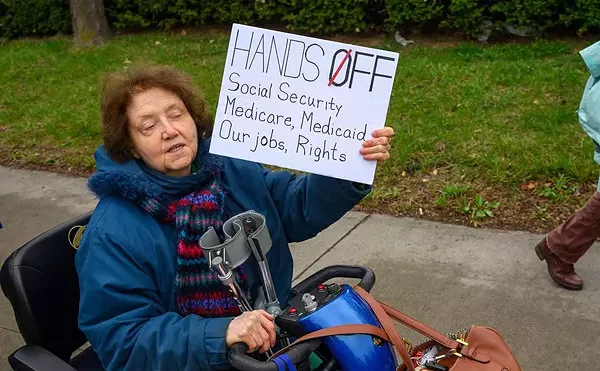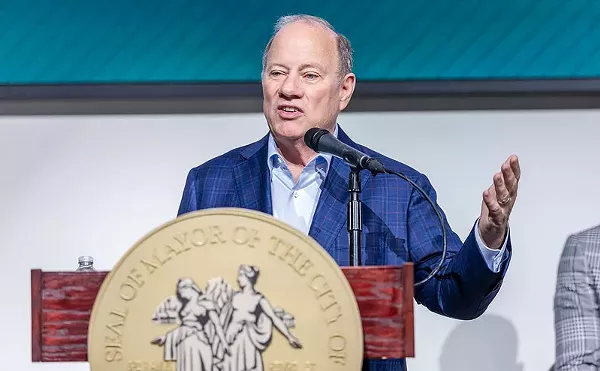
Audio By Carbonatix
[
{
"name": "GPT - Leaderboard - Inline - Content",
"component": "35519556",
"insertPoint": "5th",
"startingPoint": "3",
"requiredCountToDisplay": "3",
"maxInsertions": 100,
"adList": [
{
"adPreset": "LeaderboardInline"
}
]
}
]
Let’s admit this about Kwame Kilpatrick: He kicked media butt in the election, including mine. Brilliantly and thoroughly. I did not think he deserved another term, and I thought his opponent was a better choice, but that didn’t matter. What matters is that he persuaded the voters he was their man.
What now? Frankly, we all have to hope that he succeeds beyond our wildest expectations. Everyone always says that after an election; this time we need to really mean it. Nobody wins if Detroit continues to go down the toilet.
How do you think the rest of the nation will look at us — all of us — if Detroit collapses and is taken over by the state? Southeastern Michigan will be a bad joke, and the last place in the world anybody will want to bring new business and jobs. By the way, if you think anyone beyond Toledo makes a distinction between Livonia or Canton or Sterling Heights and Detroit, you may be too ignorant to live. To the rest of the nation, we are all Detroit.
Folks in Washington or Boston don’t try to sort out the suburbs, and neither should we. We really are all Detroit, at least till you get past Novi. Many of our troubles are caused by our artificial political boundaries, and the insane notion that we out on the fringes aren’t responsible for the center.
One of Kwame Kilpatrick’s biggest problems is that he won re-election partly by running a semi-racist campaign against those from whom he now desperately needs help. Politicians up for re-election are like crack addicts; they’ll do or say anything to anyone to get a fix of votes.
Kilpatrick, however, may have been immature, but he certainly isn’t stupid. If the city should go into receivership, if his power is stripped away, he knows he’ll be remembered as a failure, just one more young black man with promise who got caught up in the bling and lifestyle and couldn’t get it together.
What has to happen is for Detroit’s mayor to find a way to reach out to the suburban power structure and financial base. Long term, or not-so-long term, some kind of formal metropolitan or regional government needs to happen. In the meantime, Detroit and Kwame Kilpatrick need all the help they can get.
By the way, those who think Coleman Young turned his back on whitey and the suburbs don’t know their history. Yes, Coleman and L. Brooks Patterson often went at it like two pit bulls in the basement. But Young built solid partnerships with Henry Ford II and Detroit Renaissance and all manner of progressive white businessmen and political leaders.
Coleman Young thought Jesse Jackson was a contemptible bullshitter, and that William Milliken, the white governor from Traverse City, was the finest public servant he ever worked with. Check out his autobiography for proof.
Kilpatrick needs the help of the rest of the state far more than Coleman Young did. The city is in much worse shape. Detroit has fewer than 900,000 people now, and they’re leaving at the rate of a thousand a month. Worse, the ones who are fleeing are the ones the city most needs to hang on to.
He has one card to play — the elections this year. If Jennifer Granholm does not get a huge vote and a huge turnout in the city this November, she loses.
Simple as that.
Kwame Kilpatrick and the city need to assess their needs realistically and honestly and sit down with the governor and ask what can be done. What can they do together to keep Michigan’s largest city afloat?
We’ll be watching.
Shame of the nation: I would willingly spend my own money to buy a new hardcover book for each member of the newly elected Detroit school board, if I could be guaranteed they’d read it. The book is Jonathan Kozol’s Shame of the Nation: The Restoration of Apartheid Schooling in America.
Simply put, it’s the best thing ever written about what is wrong with big-city schools in this country. Kozol, a former teacher, has been speaking truth to power about inner-city education in this country since the 1960s.
This book taught me a lot. Most of all, it shows that the reason integration hasn’t worked in the nation’s public schools is that it has never really been tried, except for a few places for a few years in the ’60s and ’70s.
Where it was honestly tried, it worked. But, mainly, we never really tried integration, and we have been in a full-scale retreat from it since Ronald Reagan became president in 1981. Today, our schools are essentially as segregated in fact as they used to be by law.
Worse, the education is as unequal as it is separate. Kozol tells the story of a bright black girl in an inner city New York school who wants to take advanced placement (AP) classes, but is forced to take sewing instead.
“You are ghetto, so you sew,” a knowing classmate says with a smirk. Others are made to take courses like advanced hairdressing. The book also effectively shows what a fraud and failure the proto-military “tough discipline” models of inner-city education are. The most eloquent remarks in this book come from U.S. Rep. John Lewis, a hero of the civil rights movement.
“A segregated education in America is unacceptable,” he says. “Integration is, it still remains, the goal worth fighting for. You should be fighting for it. We should be fighting for it. It is something that is good unto itself, apart from all the other arguments that can be made.
“This nation needs to be a family, and a family sits down for its dinner at a table, and we all deserve a place at that table. ... No matter what the present mode in Washington is like, no matter what the people who are setting policy today believe, or want us to believe, no matter what the sense of temporary hopelessness that many of us often feel, we can not give up on the struggle we began and on the dream that brought us here.”
Elsewhere in this book, Harvard professor Gary Orfield makes a strong case for a new civil rights movement, a new political movement aimed at really integrating our schools. Yes, it might be hard. But so was desegregating those lunch counters, once upon a time. And this time, we can’t afford to fail.
Alzheimer’s Alert: Last week, much was made over the latest ravings by Pat Robertson, the drooling idiot televangelist. This time, he said that Israeli Prime Minister Ariel Sharon’s massive stroke was a punishment from God for giving Gaza back to the Palestinians. Earlier, he said Hurricane Katrina was possibly God’s revenge for abortion, and he blamed Sept. 11 partly on gays and feminists. The problem is not that he says such things; you can hear similar ravings in any of the better nursing homes in Macomb County.
The shame lies with the networks that still broadcast his hate-strewn garbage, and the media that publicize it. The Federal Communications Commission, weak as it has become, still goes after broadcasters who say “shit” on the air. Why isn’t it taking action against this human toxic waste dump?
Jack Lessenberry opines weekly for Metro Times. Send comments to letters@metrotimes.com




